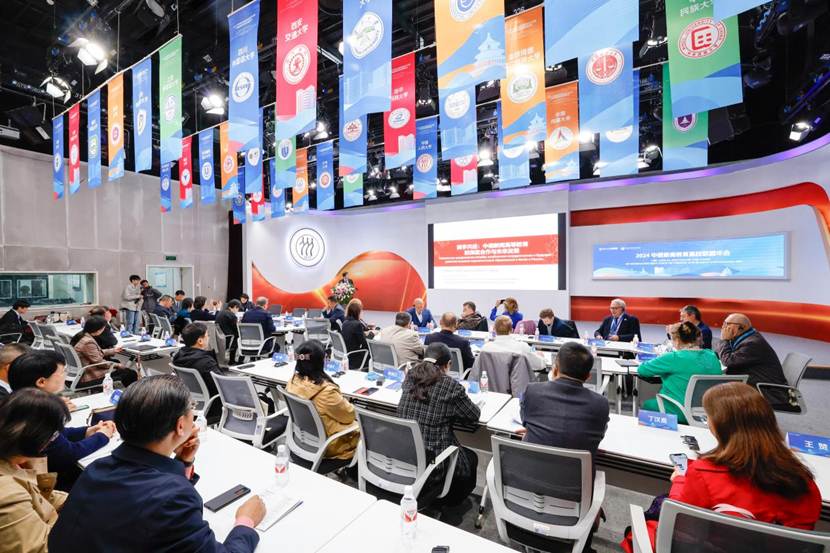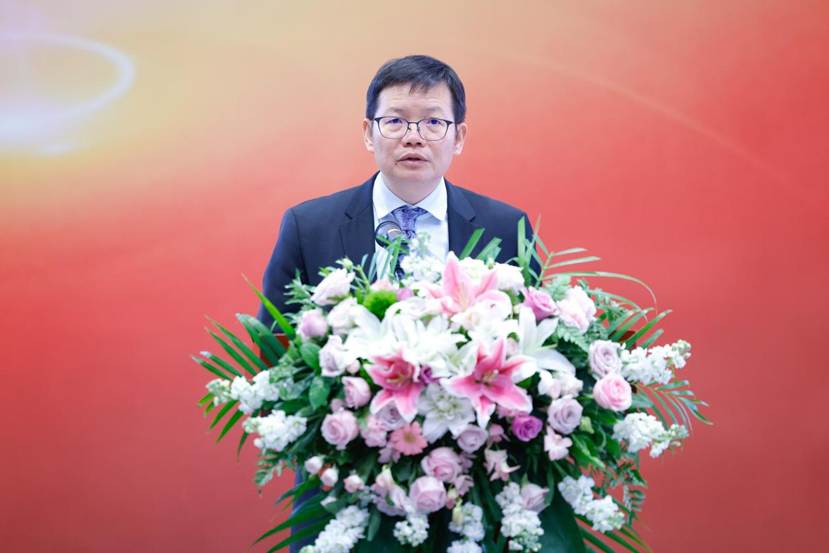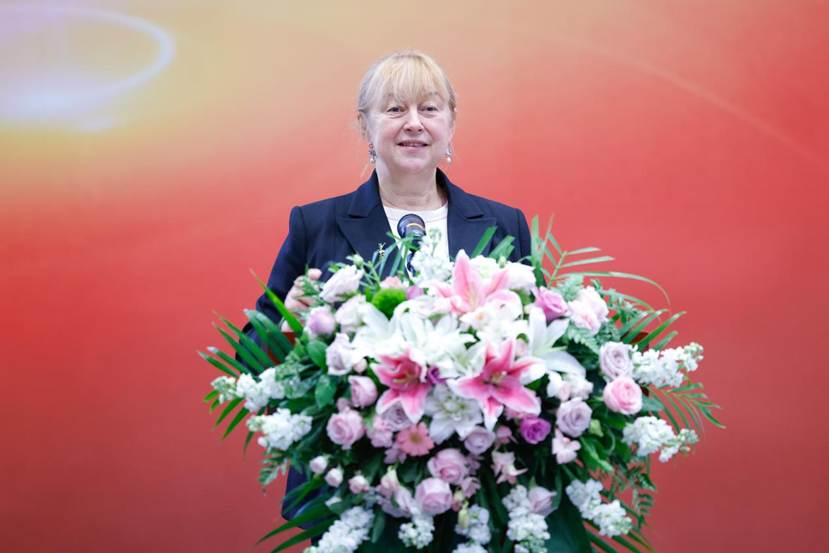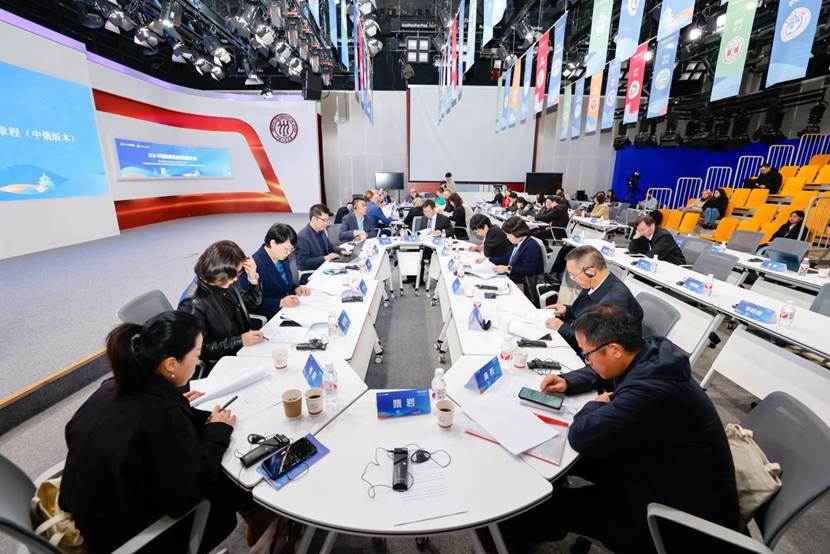The 2024 Annual Conference of the China-Russia Alliance of Journalism Education Universities was held
Exploring potential avenues for long-term collaboration between Chinese and Russian higher education institutions in the field of journalism.
In the spirit of fostering mutual understanding and collaboration, the 2024 Annual Conference of China-Russia Alliance of Journalism Education Universities was held at School of Journalism, Renmin University of China on October 19th. The event was hosted by Professor Yan Yan, Deputy Party Secretary of the School of Journalism and Communication, RUC. The event brought together scholars and representatives from 21 alliance schools of journalism education in China and Russia.
This conference aimed to promote exchanges and cooperation in the fields of journalism and communication education, scientific research, and talent cultivation. It also sought to provide a platform for cultural and academic exchanges and in-depth dialogues between China and Russia, cultivate internationalized media talents, and advance international communication efforts in the new era.

Zhou Yong, the Chinese chairman and Dean of the School of Journalism of RUC delivered a speech on behalf of Chinese universities.
In his speech, he briefly reviewed the historical background of the alliance and introduced the achievements in academic exchanges, scientific research cooperation, mutual visits of teachers and students, talent cultivation, and transformation of publishing and scientific research achievements.
He stated that in the future, both sides should explore the potential for establishing a long-term cooperation mechanism in areas including improving the alliance's operation mechanism, promoting reciprocal visits of teaching staff, strengthening teaching cooperation, expanding student exchanges, and deepening scientific research cooperation.The goal would be to collectively address the challenges posed by the new media and artificial intelligence and to contribute to the future of international journalism education.

Elena Vartanova, the Russian chairman and Dean of the Faculty of Journalism, Lomonosov Moscow State University delivered a speech on behalf of the Russian universities.
She recalled every reciprocal visit and cooperation between the two sides since the establishment of the alliance in 2016. She expressed her belief that the Chinese-Russian cooperation in the field of journalism reflects the good neighborly relations between the two sides, and lays a solid foundation for strengthening cooperation in education and research fields of journalism in the future.
Moreover, she said that new media, new technologies, and artificial intelligence have always been the focus of academic discussions, and the past achievements of cooperation are instructive for the future in-depth study in these fields. She also expressed her hope to continuously deepen the cooperation in terms of publication of works, student training, and faculty exchanges.

During the meeting, the members of the alliance engaged in a collective review of the Revised Charter of the Alliance (Chinese and Russian version). There was unanimous approval across the board for the adoption of the revised statutes.
The Chinese and Russian chairmen conferred plaques on the member units of the alliance.



During the joint seminar, Elena Vartanova,Dean of the Faculty of Journalism, Lomonosov Moscow State University, suggested that China and Russia consider establishing contacts through personnel and institutions, and drawing up a list of activities and programs to be carried out on a long - term and regular basis. At the same time, the two sides could explore a combination of online and offline modes of communication and exchange.
Viktor V. Barabash, Dean of the Faculty of Linguistics of RUDN University (Russian University of Friendship of Nations), shared his positive outlook on the potential for collaboration. He recalled that the Peoples' Friendship University had established contacts with more than 30 Chinese universities before 2016. He emphasized that the joint training program allows partner universities to share their expertise and work together to train the best students. In the future, the cultivation and cooperation among teachers will become the focus.
Aleksandr Gimelshtein, Director of the Advanced Research Institute of Journalism and Media Studies of Irkutsk State University, provided a general overview of Irkutsk State University, with a particular focus on the history and current state of journalism. He recounted that the university had updated the content of undergraduate and master's degree programs within a year, strengthened English language teaching, and expressed his hope for more Chinese students to consider studying at Irkutsk State University.
Natalia V. Poplavskaya, Deputy Dean of the Faculty of Humanities of the Peoples' Friendship University of Russia, expressed regret that the epidemic and other factors had once weakened the cooperation, and also shared her hope for increased online and offline exchanges and scientific cooperation in the future. Additionally, she called for more varied cooperation programs, such as seminars and forums between teachers and students.
Vasily Vershinin, Vice Dean of the School of Journalism at Tomsk State University, provided a general overview of the university and shared some thoughts on potential avenues for cooperation between China and Russia. He introduced Tomsk, a city with a long history and distinctive features, warmly invited Chinese universities to consider jointly carry out student exchange programs, and called for more activities related to journalism during the student exchange process.
Krivonosov Aleksei Dmitrievich, Head of the Department of Advertising and Public Relations at the School of Humanities of the Saint Petersburg State University of Economics, began his speech by recalling his first participation in the founding meeting of the alliance eight years ago and pointed out that the university has one of the highest numbers of Chinese students in the northwestern part of Russia. He suggested that the Russian and Chinese sides could jointly conduct research on media ethics study and facilitate exchanges in various forms, such as academic competitions, master classes, and academic conferences.
Tulupov Vladimir Vasilyevich, Dean of the School of Journalism of Voronezh State University, introduced the university's long and glorious history, highlighting the construction of its website on the scientific research achievements of faculty and students. He proposed that China and Russia could carry out joint scientific research activities based on similar platforms.
Roman Bakanov, Associate Professor at the Institute of Social and Philosophical Sciences and Mass Communications of the Kazan Federal University, recalled that when the alliance was first established, there were only a few Chinese students at the university. Now, he personally teaches more Chinese students than Russian ones. He proposed a potential avenue for collaborative research, noting that while Russian is relatively familiar with in Chinese mainstream media, such as the People's Daily, there remains a significant gap in understanding local media. He expressed his hope that collaborative research in this area could help bridge this knowledge gap.
Liudmila Makarova, Vice Dean of the Institute of Philology and Journalism at Lobachevsky University, introduced that four of the university’s most popular postgraduate master's programs are interdisciplinary programs between journalism and other disciplines. She also mentioned that sub-programs, such as the Artificial Intelligence and Information Technology Seminar, have attracted a large number of students. In addition, she expressed her hope for future cooperation and exchanges on related topics.

In the afternoon, some Chinese universities of the alliance held a parallel forum to discuss international exchanges and cooperation among the member universities.
In the morning of Oct. 20th, the deans of journalism schools from the Russian universities in the alliance engaged in face-to-face exchanges with faculty and students from Renmin University of China. These exchanges covered a range of topics, including the application and practice of AI technology in journalism teaching, innovations of AI journalism education in a cross-disciplinary context, and cooperation and exchanges of AI in international journalism education.
In an effort to implement the significant consensus reached by Chinese President Xi Jinping and Russian President Vladimir Putin, China and Russia collaborated to host the "Year of China-Russia Media Exchanges" in both countries simultaneously in 2016.
On July 9, 2016, the "China-Russian University Alliance of Journalism Education" was initiated by the ministries of education of China and Russia, and jointly led by Renmin University of China and Moscow State University, with the first batch of 36 well-known universities from both countries as members.
The alliance is noteworthy as the sole official alliance in the field of journalism education universities between China and Russia. It also represents a significant strategic layout for China and Russia in the areas of news dissemination, cultural exchanges, and the construction of an international discourse system.
After years of development, the "China-Russian University Alliance of Journalism Education" has promoted talent exchange, academic and scientific research cooperation within the alliance, strengthened mutual understanding and friendship between journalism and communication talents of the two countries, and fostered collaborative innovation of journalism education. This has led to mutual benefit in talent cultivation and scientific research in journalism and communication.
翻译:李泽璇
编辑:马瑞临 于怡然 肖潇 王倩



